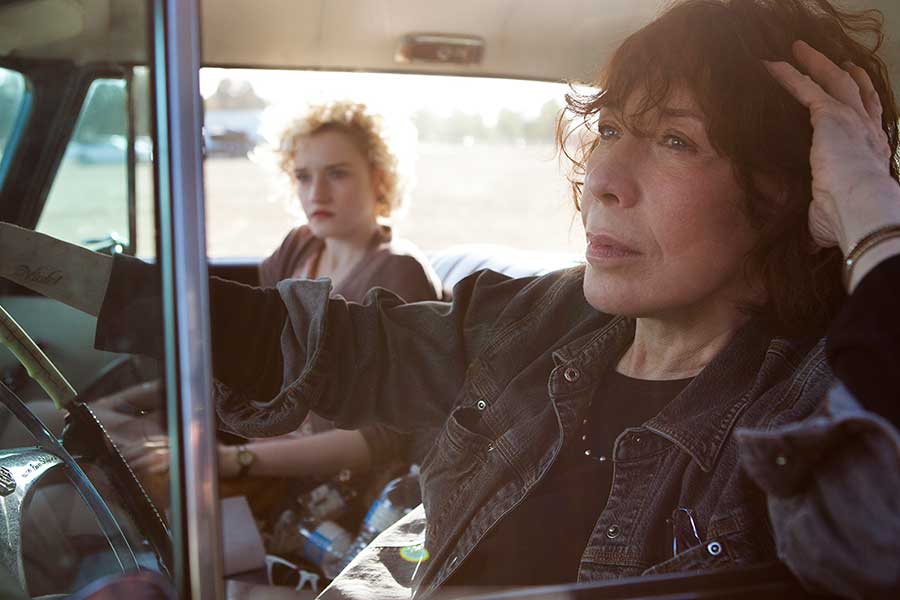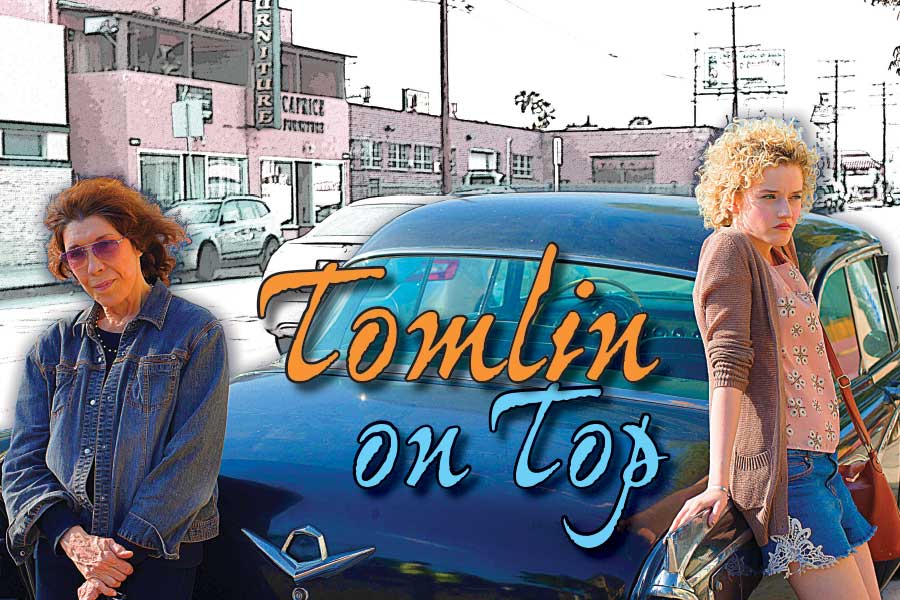
Lily Tomlin is poignant and hilarious as Elle, the acerbic title character in “Grandma.” This enjoyable lark, written and directed by Paul Weitz, gives the iconic comedienne a juicy role, one she was born to play, and Tomlin tears into it with the gusto of a pit bull with a chew toy.
The film opens with an ending: Elle, a poet and “unemployed academic,” is breaking up with her much-younger girlfriend, Olivia (Judy Greer). Elle’s deadpan response to the relationship’s failure — “I need to vacuum” — is both funny and telling; it completely brushes aside Olivia’s feelings and masks the deeper pain Elle feels too but is perhaps too proud to express.
The story begins in earnest when Elle’s granddaughter, Sage (Julia Garner), turns up on her doorstep hoping to get $630 for an abortion. Sage does not want to tell her bossy mother, Judy, (Marcia Gay Harden), about her pregnancy, and hopes her grandma can help her resolve her problem quickly and discreetly. Elle is sympathetic, but doesn’t have the money; she cut up her credit cards after paying off $27,000 of debt in hospital bills for her late lover.
Thus, the two women embark on a local, day-long road trip to visit various women and a man (Sam Elliott) Elle has known over the years who might be able to help them out with a loan.
“Grandma” is a slight, contrived story, but it yields many pleasures, most notably when Tomlin is dispensing bracingly funny one-liners, from throwaway jokes about “rapidly approaching 50,” to how “assholes” make her angry. The film is more than just a fantastic showcase for the actor, but a chance for Tomlin to play a lesbian character who was part of the feminist movement and now is living in a world where her own granddaughter does not know who Betty Friedan is. Weitz’s smart, quick-witted script mines much of its humor from Elle’s droll responses to the younger generation. Tomlin plays the irascible character as someone who struggled all her life and has little patience for anyone who is not as tough as she is. Case in point: her encounter with Cam (Nat Wolff), the teen who impregnated Sage. He is not very responsible when it comes to dealing with Sage’s situation, and how Elle handles him is a comic highlight.
When Elle and Sage get into an old Dodge that has trouble starting, it is as much a metaphor for the characters facing a moment of difficulty as it is foreshadowing car trouble later. The script is never subtle, but neither is Elle, who gets to beat up a character and also take a punch. The film’s physical comedy is amusing because the players tackle their roles with noticeable relish. The verbal dexterity is an asset as well. Sage calls Elle a “philanthrope” when she means misanthrope, and there are discussions about the term “slut” that provide some intergenerational female-centric bonding.
The film also offers some terrific supporting moments, as when Elle visits with her old friend, Deathy (Laverne Cox), a tattoo parlor artist, in the hopes of collecting some cash. Their exchange, in which the women reminisce about old times, is lovely, if all too brief. Cox has such a warm presence that viewers will want more of her, but at a brisk 79 minutes, “Grandma” needs to keep moving.
Another key episode involves Elle paying a call to Karl (Elliott), a man she once loved and lived with and dubs “the ogre.” Their conversation, about how their lives have changed over the past 30 years and what they owe one another, is especially touching. Weitz mines this scene for humor as well, with the pair smoking a joint together as a way of remembering their past and dealing with the present. More importantly, the encounter provides Elle with some soul-searching moments that Sage can also relate to. The parallels add a layer of poignancy.
If Sage’s character is the force that drives the story, she is more a straight (wo)man for Elle, who bulldozes her way into every scene. A visit to a cafe where her friend Carla (the late Elizabeth Peña) works has Elle acting out and lashing out, leaving a stunned Sage in her wake. It shows how Elle’s behavior is not always admirable.
If the story is episodic, “Grandma” is consistently fun because Tomlin makes Elle’s hard demeanor refreshing. When Judy enters the picture — and Gay Harden plays the protective momma-bear role to the shrewish hilt — there is perhaps a justification for Elle’s attitude, but the mother-daughter bonds seem real.
The film also does not cop out in its final moments, even when it threatens to become warm and fuzzy.
“Grandma” is yet another abortion comedy that joins “Juno” and “Obvious Child” in making light of a delicate situation. But it delivers the laughs thanks to Tomlin’s crackerjack timing and its cogent observations about feminism and sisterhood.
Lily speaks out
Tomlin chatted about “Grandma” and her experiences as a young woman, the feminist movement, tattoos and getting punched in the face.
PGN: As a teenager, who would you have run to if you got into trouble like Sage did?
LT: I had some adult friends, grown women 10-15 years older than I was. They lived in the apartment building I grew up in. We’ve stayed friends. One woman is in her 90s now. So I would have gone to one of those women. I had a quality about me — an air of independence — that made me seem probably older than I was. I would babysit their children, though I wasn’t much older than their kids.
PGN: One of the points in “Grandma” is that there is a generation that does not understand — or perhaps does not want to understand — the difficulties women and LGBT people have faced in the recent past.
LT: I’m sad the younger generation doesn’t know many people in the women’s movement particularly. There is more effort in the gay community about celebrating its heroes, like Harvey Milk.
PGN: You have rarely played openly gay characters on screen. Was there a reason for that?
LT: In “Tea with Mussolini,” I played an archeologist, but not much was made of her lesbianism. I did try to get the Cher part in “Silkwood.” Nora Ephron had called me and wanted me to have the part, but Mike Nichols wasn’t inclined towards me. I was never really offered anything. There weren’t that many lesbian parts out there.
PGN: How did you find a way to create Elle so that she wasn’t “Lily Tomlin”?
LT: I didn’t struggle to create a character. I didn’t have to wear a wig or anything, like I have to in big studio movies to identify the characters’ culture or type. It was my own hair, makeup, clothes and car. I think Elle was just well-created; the script was so fluid and so perfect. It is like “Grace and Frankie.”
PGN: Elle ends a relationship with Olivia, brushing aside her lover’s feelings, masking her own pain and pride. How do you see her character?
LT: Olivia just wants something Elle can’t give her at that point in her life. Elle’s still grieving from Violet’s death and turning away from that is a kind of betrayal. So she seizes the break-up in her own defense. When you have a long-term relationship, it takes a while to get over it. So if Olivia can’t take Elle on her own terms, she needs to split.
PGN: Speaking of long-term relationships, how is married life?
LT: Very sweet. We’ve been together a long time. We weren’t going to get married. We used to say we weren’t interested in imitating heterosexuals. But so many people asked us, so we decided, let’s get married. And we did, on New Year’s Eve 2013. We were glad that it comes to pass.
PGN: Do you have any tattoos, like Elle does?
LT: [Laughs] I don’t like tattoos but I like to look at them on other people. I wouldn’t want to have a tattoo myself. I have played a lot of characters with tattoos. I had a butterfly in “Flirting with Disaster” and one in “Admission.”
PGN: What about giving and getting a punch as Elle does? Have you had any notable altercations?
LT: I once had a guy punch me in the face in a bar. It was years and years ago. I’m a mouthy person. I’ve mellowed somewhat. But at the time, I put a dollar in a jukebox in a bar in the Lower East Side of New York, and this punky guy from the neighborhood came in. It was a dive bar, where some low-grade mobsters might come in at the end of the night. And this guy comes in and tells someone to unplug the jukebox. When the guy came over to unplug the jukebox, he looked over at me and asked if I minded. I said I did; I had money in it. And the punky guy came over and roughed my shoulders and said, “You don’t mind. Do you?!” And I threw a glass of water in his face. He gave me a black eye. I cried for days, I was so horrified and trespassed.
PGN: Wow! What was your relationship with your mother and your grandmother like?
LT: I was close to my mother and grandmother. My grandmother died in the 1980s. She had a lively personality. She was sweet and docile. My mother, who died 10 years ago, was very witty and kind and everybody loved her. She was never ridiculing or sarcastic — very upbeat. I wouldn’t have gone to her with anything like Sage does; I would have taken care of it myself, or gone to my friend who was a mature woman.
